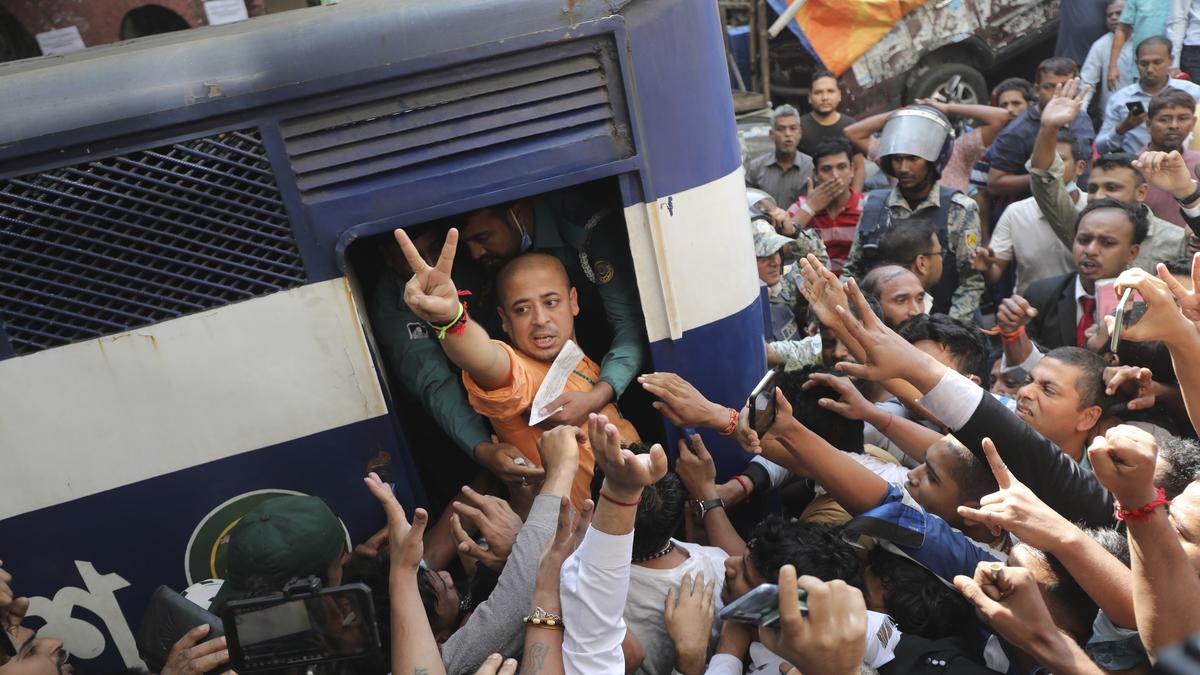 |
|
The recent unrest in Bangladesh, stemming from the denial of bail to Chinmoy Krishna Das Brahmachari, a prominent Hindu monk and spokesman for a newly formed Hindu group, highlights the escalating religious tensions within the country. Brahmachari's arrest on sedition charges and the subsequent protests leading to the death of a public prosecutor underscore a deeply polarized society grappling with complex political and religious dynamics. The incident is not an isolated event but rather a symptom of a larger, more systemic issue rooted in the aftermath of the student-led revolution that forced the long-time Prime Minister Sheikh Hasina to flee to India. The immediate aftermath of Hasina’s ouster witnessed a wave of reprisals against Hindus, perceived by some as disproportionately supporting her regime. These actions, coupled with attacks on Muslim Sufi shrines by Islamist hardliners, set the stage for the current climate of heightened religious animosity.
The denial of bail to Brahmachari acted as a catalyst, igniting protests that quickly turned violent. Supporters, angered by the court's decision, surrounded the prison van carrying Brahmachari, leading to clashes with security forces. The use of stun grenades and baton charges by the authorities further escalated the situation, resulting in the tragic death of Saiful Islam Alif, a Muslim public prosecutor. This underscores the chaotic and unpredictable nature of the situation, where the lines between protestors and bystanders, religious groups and security forces, become increasingly blurred. The death of Alif, a member of the majority Muslim community, highlights the tragic consequences of escalating sectarian violence and serves as a stark reminder of the human cost of religious division. The incident raises serious questions about the ability of law enforcement to maintain order and protect both protestors and civilians alike.
The international community, particularly India, has expressed deep concern over the escalating religious tensions in Bangladesh. India's statement, noting the arrest of Brahmachari and the multiple attacks on Hindus and other minorities, reflects a growing unease about the stability of the region. The already strained relationship between Dhaka and New Delhi has further deteriorated due to India’s hosting of Hasina, who is wanted in Bangladesh on charges of alleged crimes against humanity. This political backdrop adds another layer of complexity to the situation, as accusations of human rights abuses during Hasina's 15-year rule have further fueled the polarization. The ongoing tensions and the lack of a clear path towards reconciliation raise serious questions about the future of religious harmony in Bangladesh. The international community must engage constructively, urging dialogue and emphasizing the importance of de-escalation and reconciliation between different religious groups.
The current situation demands a multi-pronged approach. Firstly, a thorough and impartial investigation into the death of Saiful Islam Alif is crucial to ensure accountability and prevent further escalation. This investigation should not only determine the immediate cause of death but also examine the underlying factors contributing to the violence. Secondly, open dialogue and mediation efforts between different religious groups, facilitated by respected community leaders and potentially international organizations, are essential. Such initiatives must focus on addressing the root causes of the conflict and fostering mutual understanding and respect. Thirdly, the government of Bangladesh must take decisive action to protect the rights of all its citizens, regardless of their religious affiliation. This includes providing adequate security to vulnerable communities, ensuring swift and fair justice for those responsible for acts of violence, and promoting policies that encourage social cohesion and religious tolerance.
The events in Bangladesh serve as a cautionary tale about the dangers of unchecked religious polarization and the importance of proactive measures to prevent escalation. The international community's response will be crucial in guiding Bangladesh towards a path of peace and reconciliation. Failure to address the underlying issues risks further instability, potential humanitarian crises, and further deterioration of regional relations. A sustained commitment to dialogue, justice, and the protection of human rights is vital to prevent a full-blown religious conflict from erupting in Bangladesh, and to foster a more peaceful and inclusive society for all its citizens.
